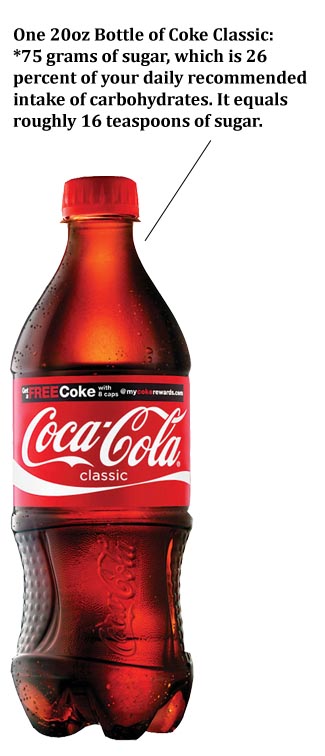That soft drink in your hand is telling your brain to do things.
Researchers at Oregon Health and Sciences University say that a certain kind of sugar – fructose – is found to affect a part of your brain in a different way than other kinds of sugars.
 Fructose is an extremely common sugar found naturally in nearly everything we eat. It's an essential nutrient, but it's overabundance in processed food has also earned the ire from nutrition scientists who say it is partially to blame for the obesity epidemic in the United States.
Fructose is an extremely common sugar found naturally in nearly everything we eat. It's an essential nutrient, but it's overabundance in processed food has also earned the ire from nutrition scientists who say it is partially to blame for the obesity epidemic in the United States.
For processed food manufacturers, High Fructose Corn Syrup has become a staple ingredient in everything from bread to soda. To fully understand what the study means – and doesn't mean – it's important to understand the basics of sugar.
Basic white sugar – which is typically derived from either sugar beets or sugar cane – is made up of pure sucrose. Sucrose is a carbohydrate formed from the combination of the molecules of fructose and glucose. When you consume white sugar, for example, your body then breaks down the sucrose (sugar) into its two parts – fructose and glucose.
The research found that fructose and glucose – despite being very similar on a molecular level — affect areas of the brain in different ways. Using a "functional MRI," which measures brain activity in real time, researchers found that neither fructose nor glucose affected the area of the brain that regulates food intake.
In test subjects injected with pure glucose, the areas of the brain that control responses to food taste, smells and pictures, were activated. Fructose, on the other hand, inhibited these same areas of the brain.
Lead researcher Dr. Jonathan Purnell says the research partially answers why two similar sugars affect the brain in different ways.
"There's plenty of animal data and now human data that suggests fructose, which is a different compound from glucose from a simple carbohydrate standpoint," he said. "has markedly different metabolic effects on food intake and body weight. What this supports is that in the brains of humans … that the brain responds differently to these two compounds, in the opposite manner."
In other words, your body does one thing with glucose, but another with fructose.
A 2009 study by researchers at University of California-Davis demonstrated that consuming fructose-sweetened beverages will cause unnatural fat distribution. The report, published in the May 2009 Journal of Clinical Investigation, found that test subjects who consumed fructose beverages, along with a diet of their choice, gained significantly more abdominal weight when compared to glucose-beverage drinkers. Both groups gained the same amount of fat during the study period.
Robert Lustig M.D., a neuroendocrinologist at the University of California-SF, considers fructose to be a poison.
That's right. All those sugar-packed drinks, "teas" and candies young and old alike love to consume? Lustig says they're slowly killing us. In particular, Lustig says soda has helped fuel the increase in about a dozen illnesses.
"It's like drinking a pizza," he says, adding that soft drink companies have to add high amounts of sugar to disguise the high amounts of salt contained in the beverages.
Fructose also may play a role in suppressing a hormone called Leptin, which plays a key role in regulating our appetites, he says.
"If you feed a kid a can of soda and unleash him on a meal, does he eat less or does he eat more? He's just consumed 150 calories, yet he eats more," Lustig said.
Lustig also says that chronic Fructose consumption can cause eight of the 12 diseases commonly associated with alcoholism, and there is evidence that it can also lead to Chronic Metabolic Syndrome – which is characterized by central obesity (the location of fat around the waist), hypertension, type 2 diabetes, high blood pressure, lipid problems and elevated triglycerides (which can increase risk of heart disease and stroke).
Purnell says the OHSU study should cause consumers to pay more attention to the ingredients in their food.
"This study is supportive of emerging literature that fructose, as a food additive, is not something we want to be advocating for the wider population," Purnell said.
- Home
- News
- Opinion
- Entertainment
- Classified
- About Us
 MLK Breakfast
MLK Breakfast- Community
- Foundation
- Obituaries
- Donate
11-23-2024 7:03 am • PDX and SEA Weather














































































































































































































































































































